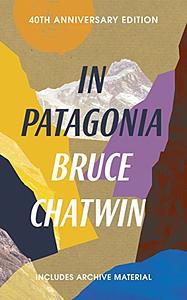Take a photo of a barcode or cover
This was a recommended read for my horse riding adventure in Patagonia. I'm not sure why because the author never traveled in the area where we were. It is a travel narrative but very rambling. Not really sure what the point was. He covered a lot of history and it was useful to see how much of Argentina is populated and influenced by Europe, something that was very evident on my trip. But otherwise not worth the time.
adventurous
informative
inspiring
reflective
medium-paced
adventurous
informative
slow-paced
I appreciated Chatwin's descriptions of the Patagonian landscape, but most of his account focuses on European settlers in Patagonia. I would have preferred more focus and attention paid to the wider history of the region, specifically its native people.
There were some interesting bits of history tucked into the book, but the whole thing felt like Chatwin was playing a little fast and loose with facts. The structure was very fragmented, which made it difficult to feel invested or absorbed in the narrative.
There were some interesting bits of history tucked into the book, but the whole thing felt like Chatwin was playing a little fast and loose with facts. The structure was very fragmented, which made it difficult to feel invested or absorbed in the narrative.
While technically a travel account, In Patagonia is more like a history lesson of the various areas, specimens, and people who either lived in or found their way to Patagonia. Chatwin introduces colorful characters ranging from German settlers to a native who may have inspired Shakespeare. You hear of Butch Cassidy's escapades in the area and even encounter the old stomping grounds of the infamous prehistoric giant sloths.
I had the expectation for Chatwin to be a central figure which the book followed as he encountered the various places and people throughout his story. However, he often seemed content to bow out and not offer much more than being a placeholder in certain situations. In theory this sounds like a good strategy when highlighting a subject, but often his absences made the vignettes seem like random bits just thrown in a pot together.
Due to the lack of a consistently central plot or focus the book does plod along at times, and I'll admit to wondering more than once why we were focusing on a particular event or person. Chatwin's encounters and recountings do offer a lot of interesting background and factoids about Patagonia and its characters, but not not all them are as interesting as others, particularly when the vignettes become Inception-esque flashbacks and history lessons.
All-in-all, I would recommend this book to those with an interest in the area or with a bent towards history studies. It doesn't read like a typical travel account and so might not be what one may expect, but there's still plenty to appreciate.
I had the expectation for Chatwin to be a central figure which the book followed as he encountered the various places and people throughout his story. However, he often seemed content to bow out and not offer much more than being a placeholder in certain situations. In theory this sounds like a good strategy when highlighting a subject, but often his absences made the vignettes seem like random bits just thrown in a pot together.
Due to the lack of a consistently central plot or focus the book does plod along at times, and I'll admit to wondering more than once why we were focusing on a particular event or person. Chatwin's encounters and recountings do offer a lot of interesting background and factoids about Patagonia and its characters, but not not all them are as interesting as others, particularly when the vignettes become Inception-esque flashbacks and history lessons.
All-in-all, I would recommend this book to those with an interest in the area or with a bent towards history studies. It doesn't read like a typical travel account and so might not be what one may expect, but there's still plenty to appreciate.
Very direct, accessible writing style. It felt like I'd traveled back in time to wander about with a charming companion.
adventurous
informative
reflective
slow-paced
adventurous
lighthearted
mysterious
fast-paced
I have reasons to believe that, even given the sources by Chatwin himself at the end of this book, that he is an unreliable narrator, dipping his pen into both the fiction and non-fiction inkwells to concoct these stories. While I’m not opposed to such, the book is rather presented as historical or autobiographical. Either way, it begins with a scrap of fossil and winds its way through Patagonian history and myth to track down another similar fossil. The book is written in haphazard segments, charitably called chapters, which may or may not relate to previous chapters. Characters are introduced and dispensed with as though they were mere attendees at a soirée that Chatwin is crashing. Some of the writing is engaging, but mostly it’s a meandering travelogue that hits on some Chilean/Argentinian high points.
Minor: Alcoholism, Animal death, Body shaming, Cancer, Confinement, Death, Genocide, Gun violence, Homophobia, Mental illness, Misogyny, Racism, Suicide, Violence, Excrement, Police brutality, Kidnapping, Grief, Cannibalism, Murder, Abandonment, Colonisation, War, Injury/Injury detail, Classism, Deportation
This book is a meandering mix of Chatwin's travels through Patagonia in search of information about a relative who once lived and explored there, mixed with history of sorts, anecdotes from everyone from the native tribes to Butch Cassidy and the Sundance Kid. I spent the first part of the book trying to figure out where he was going with all the bits and pieces, and kept reading, partly because each chapter was so short, to eventually understand that he was telling the story of his adventures as he uncovered a history of adventures. An entertaining book with glimpses into what Patagonia is like and why.
Continually forgot this wasn't pure fiction. Really interesting book




